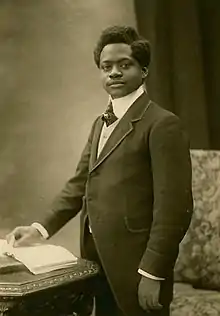
Paul Panda Farnana M'Fumu (1888 – 12 May 1930) was a Congolese agronomist and expatriate who lived in Europe in the first decades of the 1900s. He has been considered to be the first Congolese intellectual.
Early life and education
Paul Panda Farnana was born in Zemba-lez-Moanda, Bas-Congo Province, Congo Free State in 1888. He was the son of Luizi Fernando, a government-appointed chief,[1] and a woman named N'Sengo.[2] A Belgian official, Lieutenant Jules Derscheid, offered to bring Farnana to Belgium to receive an education. He accepted, and they arrived in Brussels on 25 April 1900.[1] Once there, Dersheid turned custody of Farnana over to his sister, Louise. Farnana was brought up in an upper-class setting. Louise educated him in music and drawing and sent him to the Athénée Royal d'Ixelles for a secondary education.[3] In 1904, he passed an entrance exam and was enrolled in a horticultural and agricultural school in Vilvoorde, graduating three years later with distinction. In 1908, Farnana studied at an institute for tropical agriculture in Nogent-sur-Marne, Paris, France. That same year he studied English in Mons.[1] This education made him the first Congolese to ever receive a diploma of higher education in Belgium.[4]
Career and activism
In 1909, Farnana was hired as an agricultural specialist by the Belgian colonial government which had since transformed the Congo Free State into the Belgian Congo. In June, he was assigned to the Botanic Garden of Eala, near Coquilhatville.[1]
Shortly before the outbreak of World War I Farnana was living in Belgium. When Belgium was invaded by Germany in 1914, Farnana enlisted in the Belgian Army.[5] He served with the Korps der Congolese Vrijwilligers (Congolese Volunteers Corps) during the Siege of Namur. On 23 August 1914, he was taken prisoner in Liège, together with Joseph Adipanga and Albert Kudjabo, and deported to Germany where he spent the remainder of the war.[6][7] After his release, he founded an association known as the Union Congolaise to advocate for the interests of other Congolese veterans of the war.[5]
Farnana participated in the first and second Pan-African Congresses in 1919 and 1921, respectively. He also attended the First National Belgian Colonial Congress in 1920.[8] He actively criticized Belgian colonial practices, arguing that the ban on forced labour in the Congo was not being consistently applied and education for the native population was inadequate. He also called for the Congolese to be granted political rights.[9]
In 1929, Farnana went to Matadi to manage an oil mill. He died there nine months later.[10]
Legacy
Farnana is considered by historians to be the first Congolese intellectual.[8] Following his death, Belgium forbade any further Congolese from studying in Belgium.[4]
Farnana's work was largely forgotten by the public until Congolese historians began uncovering details about his life in the 1970s and 1980s. A Belgian documentary was made about him in 2008.[11]
See also
- Stefano Kaoze, first Congolese priest
- Thomas Kanza, first Congolese university graduate
- Sophie Kanza, first woman Congolese university graduate
- Marcel Lihau, first Congolese law student
Citations
- 1 2 3 4 Akyeampong & Gates 2012, p. 348.
- ↑ Coosemans 1952, p. 668.
- ↑ Brosens 2014, paragraphs 6, 8.
- 1 2 "Panda Farnana, un Congolais qui dérange de Françoise Levie". Africa Vivre (in French). August 2014. Retrieved 29 December 2016.
- 1 2 Doumanis 2016, Moving People and Exporting Conflicts.
- ↑ "Paul Panda Farnana, a Congolese nationalist and pan-Africanist". AfricaMuseum. Retrieved 2021-12-21.
- ↑ Brosens 2014, paragraph 9.
- 1 2 Vanthemsche 2012, p. 63.
- ↑ Bobineau & Gieg 2016, p. 20.
- ↑ Du Bois 1930, p. 312.
- ↑ Akyeampong & Gates 2012, p. 350.
References
- Akyeampong, Emmanuel Kwaku; Gates, Henry Louis (2012). Dictionary of African Biography. Vol. 6. OUP USA. ISBN 9780195382075.
- Bobineau, Julien; Gieg, Philipp, eds. (2016). The Democratic Republic of the Congo. La République Démocratique du Congo. LIT Verlag Münster. ISBN 9783643134738.
- Brosens, Griet (2014). "Congo on Yser : The 32 Congolese soldiers in the Belgian army in the First World War". Cahiers Bruxellois. Brussels (XLVI): 243–255. doi:10.3917/brux.046e.0243. ISBN 9782874880155.
- Coosemans, M. (1952). "Panda Farnana (M'Fumu Paul)". Biographie belge d'outre-mer (in French). Vol. III. Brussels: Académie Royale des Sciences d'Outre-Me. OCLC 493473172.
- Doumanis, Nicholas, ed. (2016). The Oxford Handbook of European History, 1914-1945. Oxford University Press. ISBN 9780191017766.
- Du Bois, W. E. B., ed. (September 1930), "West Africa", The Crisis, vol. 37, ISSN 0011-1422
- Vanthemsche, Guy (2012). Belgium and the Congo, 1885-1980 (illustrated ed.). Cambridge University Press. ISBN 9780521194211.